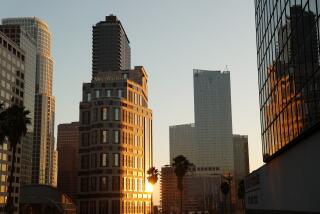Burbank Finds Itself With an Abundance of Office Space
After years of turning away tenants from fully leased office buildings, Burbank landlords are putting out the welcome mat.
A surge in new construction, weak demand and the ongoing retrenchment in the entertainment business--the city’s largest employer and user of office space--sent Burbank’s once rock-bottom vacancy rate soaring to 15.2% at the end of last year, according to the real estate firm Insigna/ESG. Newly constructed office buildings remain empty and landlords are being undercut by tenants who are trying to sublet unwanted space at bargain rates.
Despite talk of upcoming leasing deals and high levels of tenant interest, most real estate observers don’t expect Burbank’s office market, which totals about 6.5 million square feet of space, to show noticeable improvement until the latter half of the year at the earliest. Some forecast that vacancy will rise well beyond 20% as new buildings to open.
“You have [new space] coming on to the market at a time when demand is not as great as it has been,” said broker Bill Boyd at the real estate firm Grubb & Ellis. “The results will continue to spike [up] the vacancy rate.”
During much of the 1990s, Burbank’s office market was one of the tightest in the region as rapidly expanding entertainment firms packed into the high-rises in the city’s Media District near the Ventura Freeway and Alameda Avenue, an area within walking distance of Walt Disney, Warner Bros. and NBC studios. With little room left in the Media District, entertainment firms and related companies began to expand into former industrial property near Burbank Airport on the city’s north side. Demand was strong enough that it overflowed into high-rises along Brand Boulevard in neighboring Glendale.
“There wasn’t that much space available and there was an incredible growth spurt,” said broker Todd Doney of Insigna/ESG.
By 1997, with vacancy falling below 5%, many developers began planning a new wave of construction to take advantage of the hot market. Now some of the projects conceived during the market’s peak are being completed amid lackluster demand. Burbank’s office market is expected to expand by about 15% during 2001 and 2002 as an estimated 900,000 square feet of new space is completed, according to Insigna/ESG.
Unless developers put the brakes on planned projects, the city’s office vacancy rate could continue climbing well into 2003, according to Insigna/ESG research executive Kevin Morrow.
“It’s going to take a lot of time to absorb all this new construction,” he said.
The conditions have left prospective tenants with the luxury of shopping for space in new and empty projects in the Media District and near the airport. Landlords are often reluctant to reduce rents, but not tenants, some of whom are offering to sublease excess space at substantial discounts. In the airport area, for example, some sublease space is being offered at 35% below the $27 per square foot being sought by the typical landlord, Boyd said.
“It’s hard to get attention of tenants at $27 when they can get sublease space at $18,” Boyd said.
Meanwhile, the long awaited Pinnacle, a 425,000-square-foot office complex at Olive Avenue and the Ventura Freeway in the Media District is due to be completed by April but has so far failed to land any tenants. The building’s chief leasing broker, Carl Muhlstein of Cushman & Wakefield, said it is not unusual for buildings to open without any pre-leasing. He added that there has been substantial interest in the Pinnacle, which is being built by one of Burbank’s largest developers, M. David Paul & Associates, from tenants in post-production, new media and financial services industries.
“We are in heavy negotiations,” Muhlstein said.
Muhlstein and other real estate observers say that new construction has made Burbank one of the few cities in the area with large chunks of space suitable for large corporate tenants. Companies including City National Bank, Turner Broadcasting and Warner Music Group have been looking very closely as leasing large amounts of space in Burbank, said several brokers.
And even though entertainment firms continue to retrench, many companies prefer to house their remaining operations as close as possible to their headquarters and the entertainment industry bastions of Burbank, said Jeffrey Worthe, who is overseeing the Pinnacle for M. David Paul.
“There has always been a demand to be in or near the studio lots,” said Worthe, whose firm is also active in projects near Burbank Airport. “They are not picking up and moving their studio lots.”
More to Read
Inside the business of entertainment
The Wide Shot brings you news, analysis and insights on everything from streaming wars to production — and what it all means for the future.
You may occasionally receive promotional content from the Los Angeles Times.










